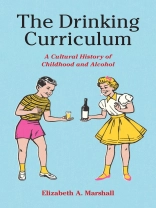A lively exploration into America’s preoccupation with childhood innocence and its corruption
In The Drinking Curriculum, Elizabeth Marshall brings the taboo topic of alcohol and childhood into the limelight. Marshall coins the term “the drinking curriculum” to describe how a paradoxical set of cultural lessons about childhood are fueled by adult anxieties and preoccupations. By analyzing popular and widely accessible texts in visual culture—temperance tracts, cartoons, film, advertisements, and public-service announcements—Marshall demonstrates how youth are targets of mixed messages about intoxication. Those messages range from the overtly violent to the humorous, the moralistic to the profane. Offering a critical and, at times, irreverent analysis of dominant protectionist paradigms that sanctify childhood as implicitly innocent, The Drinking Curriculum centers the graphic narratives our culture uses to teach about alcohol, the roots of these pictorial tales in the nineteenth century, and the discursive hangover we nurse into the twenty-first.
Table des matières
Introduction : Learning to Drink | 1
Lesson One: D is for Drunkard | 15
Lesson Two: No Pets, No Drunks, No Children | 34
Lesson Three: “Friends Don’t Let Friends Drink and Drive” | 49
Lesson Four: It’s Funny When Kids Drink | 63
Lesson Five: Mommy Needs a Cocktail | 80
Final Exam | 99
Acknowledgments | 105
Notes | 107
Index | 129
A propos de l’auteur
Elizabeth Marshall is an associate professor at Simon Fraser University, where she teaches courses on children’s literature, childhood, and popular culture. She is the author of Graphic Girlhoods: Visualizing Education and Violence (2018) and co-author with Leigh Gilmore of Witnessing Girlhood: Toward an Intersectional Tradition of Life Writing (2019).












